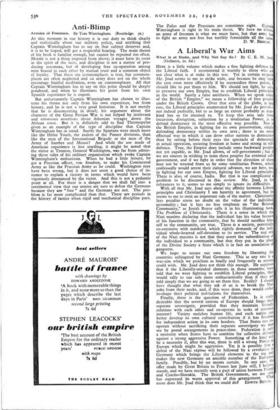Anti-Blimp
Armies of Freemen. By Tom Wintringham. (Routledge. 58.) AT this moment in our history it is our duty to think clearly and realistically about our military policy, and anything that Captain Wintringham has to say on that subject deserves and, it is to be hoped, will get a respectful hearing. The main theme of his book is familiar enough, but cannot be repeated too often. Morale is not a thing imposed from above; it must have its roots in the spirit of the men, and discipline is not a matter of pro- ducing automata, but of developing free co-operation among men bound to each other by mutual trust and a common object of loyalty. That these are commonplaces is true, but common- places are often neglected and an army does not on the whole encourage fruitful meditation, even on commonplaces. All that Captain Wintringham has to say on this point should be deeply pondered, and when he illustrates his point from his own Spanish experience he is cogent.
But unfortunately Captain Wintringham has chosen to illus- trate his theme not only from his own experience, but from history, and he is not a very good historian. It is not merely that he is disconcerting in detail; his argument about the character of the Great Persian War is not helped by irrelevant and erroneous assertions about Athenian voyages down the African coast. But it is definitely odd to find Thermopylae given as an example of the type of discipline that Captain Wintringham has in mind. Surely the Spartans were much more like the Hitler Youth, the zealots of the Panzer divisions, than like the men of the International Brigade or the men of the Army of Sambre and Meuse? And while the use made of American experience is less startling, it might be noted that the victor at Trenton, General Washington, was far from admir- ing those sides of his military organisation which evoke Captain Wintringham's enthusiasm. When he had a little leisure, he got a Prussian officer, von Steuben, to make his Continental Army as like the Prussian Army as he could. Washington may have been wrong, but it does not seem a good choice of in- stance to explain a victory in terms which would have been vigorously denounced by the victor. And this is not a pedantic point at all. For there is a danger that we shall fall into a sentimental view that our armies are sure to defeat the Germans because they are " free " and the Germans are not. The pro- blem is far more complicated than that. There are periods in the history of tactics when rigid and mechanical discipline pays.
The Zulus and the Prussians are sometimes right. Capt Wintringham is right in his main thesis. We have no choke an army of freemen is what we must have, but that army ha to fight an army not free but terribly formidable all the same
D. W. BROGAN.


























































 Previous page
Previous page